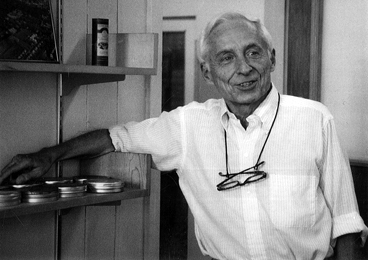Richard Cartwright, a founding figure of philosophy at MIT and a member of the faculty for nearly 30 years, died on Dec. 19. He was 85.
A formidable critic, of his own work as well as others', he was known for a small number of classic papers in metaphysics and philosophy of language, but especially for his influence on colleagues and students. Skeptical of easy solutions, but at the same time deeply respectful of common sense, much of his endeavor was to see questions clearly enough to be able to begin answering them. Where the territory is ill-defined, he held, "difference of opinion is premature."
Born in 1925, Cartwright took his BA from Oberlin College in 1945 and his PhD from Brown in 1954. He then taught at Michigan, where he met his future wife, Helen Morris, herself a philosopher, and then at Wayne State. In 1967 he moved to MIT, where he was appointed to strengthen the new graduate program, and where he continued to teach until his retirement in 1996.
Cartwright's impact on philosophy at MIT, and on the graduate program in particular, was enormous. Impressed by the intensive training offered to scientists and engineers, with their frequent problem sets, Cartwright set out to offer something similar to the incoming philosophy graduate students. The result was the proseminar, a three-hour twice-weekly class in which the students discussed philosophical problem sets and gave presentations on key philosophical texts under the eye of Cartwright and his colleagues. The rigor and clarity that he required left its mark on many generations of MIT students and, indirectly, on many other graduate students at institutions where the proseminar has been emulated.
Cartwright was also a forthright administrator, serving twice as head of philosophy, and also as head of the humanities department. Here again his intolerance of cant and intellectual laziness made him a force in the administration of the humanities in general and of philosophy in particular.
The Department of Linguistics and Philosophy will organize an event in his memory at a later date.
A formidable critic, of his own work as well as others', he was known for a small number of classic papers in metaphysics and philosophy of language, but especially for his influence on colleagues and students. Skeptical of easy solutions, but at the same time deeply respectful of common sense, much of his endeavor was to see questions clearly enough to be able to begin answering them. Where the territory is ill-defined, he held, "difference of opinion is premature."
Born in 1925, Cartwright took his BA from Oberlin College in 1945 and his PhD from Brown in 1954. He then taught at Michigan, where he met his future wife, Helen Morris, herself a philosopher, and then at Wayne State. In 1967 he moved to MIT, where he was appointed to strengthen the new graduate program, and where he continued to teach until his retirement in 1996.
Cartwright's impact on philosophy at MIT, and on the graduate program in particular, was enormous. Impressed by the intensive training offered to scientists and engineers, with their frequent problem sets, Cartwright set out to offer something similar to the incoming philosophy graduate students. The result was the proseminar, a three-hour twice-weekly class in which the students discussed philosophical problem sets and gave presentations on key philosophical texts under the eye of Cartwright and his colleagues. The rigor and clarity that he required left its mark on many generations of MIT students and, indirectly, on many other graduate students at institutions where the proseminar has been emulated.
Cartwright was also a forthright administrator, serving twice as head of philosophy, and also as head of the humanities department. Here again his intolerance of cant and intellectual laziness made him a force in the administration of the humanities in general and of philosophy in particular.
The Department of Linguistics and Philosophy will organize an event in his memory at a later date.






